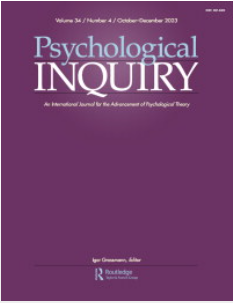自我增强不太可能需要身体暗示,也不太可能是促进环境掌握的长期成功方法
IF 7.2
2区 心理学
Q1 PSYCHOLOGY, MULTIDISCIPLINARY
引用次数: 0
摘要
身份保护的稳态模型中描述的心理免疫概念是否为人们期待已久的问题提供了答案,即为什么人类的社会认知往往以自私的方式倾斜?身份保护的稳态模型借鉴了以前的答案,但又添加了新的元素。例如,研究人员先前认为,自我增强(即在身份保护的稳态模型中称为自我增强和自我保护)是规范性的,可以对环境控制产生积极影响(例如,Beer和Harris,2019;Taylor和Brown,1988年)。理论家们还认为,进化选择了自我增强,更具体地说,选择了自我欺骗过程,这样个人就可以通过欺骗他人来提高自己的体质(von Hippel&Trivers,2011)。身份保护的稳态模型建立在这些思想的基础上,认为自我身份威胁产生的情绪信号会触发自我增强和其他自我保护过程,旨在提供免疫力,随后恢复最佳环境控制所需的心理稳态。这一理论很有趣,在考虑现有研究的全部范围时,提出了许多问题。例如,需要更多的信息来了解体细胞信号的拟议作用是否被夸大,自我增强是否是增强进化适应性的可行策略,以及关注自我增强的身份保护功能在多大程度上占据了其在人类社会认知中的大部分作用。本文章由计算机程序翻译,如有差异,请以英文原文为准。
Self-Enhancement is Unlikely to Require Somatic Cues nor is it Likely to be a Successful Long-Term Approach to Promoting Environmental Mastery
Does the concept of psychological immunity as described within the Homeostatic Model of Identity Protection provide the long-awaited answer to the question of why so much of human social cognition tends to be skewed in a self-serving manner? The Homeostatic Model of Identity Protection draws from previous answers yet adds in new elements. For example, researchers have previously posited that self-enhancement (i.e., referred to as self-enhancement and self-protection in the Homeostatic Model of Identity Protection) is normative and can have positive consequences for environmental control (e.g., Beer & Harris, 2019; Taylor & Brown, 1988). Theorists have also suggested that evolution selects for self-enhancement and, more specifically, selfdeception processes so that individuals can improve their fitness by deceiving others (von Hippel & Trivers, 2011). The Homeostatic Model of Identity Protection builds on these ideas by suggesting that emotional signals arising from selfidentity threats trigger self-enhancement and other self-protective processes designed to provide immunity and subsequently restore the psychological homeostasis needed for optimal environmental control. The theory is intriguing and raises a number of questions when considered in light of the full scope of available research. For example, more information is needed to understand whether the proposed role of somatic signals is overstated, whether self-enhancement is a feasible strategy to bolster evolutionary fitness, and the extent to which focusing on the identity protection function of self-enhancement captures the bulk of its operation in human social cognition.
求助全文
通过发布文献求助,成功后即可免费获取论文全文。
去求助
来源期刊

Psychological Inquiry
PSYCHOLOGY, MULTIDISCIPLINARY-
CiteScore
10.30
自引率
1.10%
发文量
31
期刊介绍:
Psychological Inquiry serves as an international journal dedicated to the advancement of psychological theory. Each edition features an extensive target article exploring a controversial or provocative topic, accompanied by peer commentaries and a response from the target author(s). Proposals for target articles must be submitted using the Target Article Proposal Form, and only approved proposals undergo peer review by at least three reviewers. Authors are invited to submit their full articles after the proposal has received approval from the Editor.
 求助内容:
求助内容: 应助结果提醒方式:
应助结果提醒方式:


